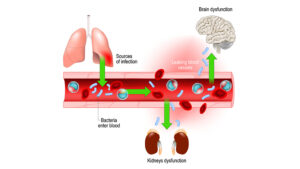Sepsis can start with something as ordinary as a fever or tummy ache—but in children, it can escalate to life-threatening organ failure in hours. Early recognition and rapid action save lives. Consultant paediatrician Dr Olive Lee Pei Ee explains what parents need to know to spot warning signs and act fast.
WORDS LIM TECK CHOON
 FEATURED EXPERT FEATURED EXPERTDR OLIVE LEE PEI EE Consultant Paediatrician and Paediatric Intensivist Sunway Medical Centre |
Sepsis is a severe and sometimes fatal response to infection.

- Sepsis occurs when the body’s immune system overreacts, triggering widespread inflammation.
- This can damage tissues and organs, and, in severe cases, lead to shock and death.
Globally, the World Health Organization (WHO) estimates that sepsis affects 49 million people every year, causing around 11 million deaths.
- Tragically, nearly half of these deaths occur in children.
- The danger lies in how quickly sepsis can escalate and how subtle its early signs can be.
Dr Olive Lee Pei Ee tells us: “In sepsis, the abnormal immune response can escalate like a fire spreading through a forest. A seemingly minor cough or fever can turn life-threatening if not recognized early.”
HOW SEPSIS AFFECTS CHILDREN
Children are particularly vulnerable because they cannot always communicate how unwell they feel.
Young children and infants may simply become quieter, more withdrawn, or unusually irritable—signs that are easy to dismiss as a minor illness.
| According to the Malaysian National Neonatal Registry, nearly 1,000 cases of early-onset sepsis were reported in newborns between 2015 and 2020, most commonly caused by infection by bacteria known as group B Streptococcus. |
Dr Lee adds tells us:
- The younger the child, the more at risk they are.
- Children with chronic illnesses, compromised immunity, or obesity may also face higher risks.
- Sepsis in children can develop rapidly, sometimes within hours of initial symptoms.
- Delays in recognizing the warning signs can be fatal.
Signs to Watch Out For
Parents and caregivers should be alert to subtle but significant changes in a child’s behaviour or appearance. According to Dr Lee, these changes include:
- Unusual sleepiness or difficulty in waking up
- Persistent vomiting or refusal to eat
- Breathlessness or rapid breathing
- Extreme temperature changes, either very hot or very cold
- Floppiness or sudden loss of strength
“Time is of the essence. Sepsis can progress very quickly,” she reminds us.
TREATMENT OF SEPSIS
Sepsis requires immediate medical attention.
- Once in hospital, doctors typically use intravenous antibiotics, fluids, and supportive care to stabilize the child’s condition.
- In severe cases, intensive care may be necessary to manage the child’s organ functions.
Even after surviving sepsis, children may face ongoing health challenges, known as post-sepsis syndrome. This can include:
- Muscle weakness
- Developmental delays
- Cognitive or emotional difficulties
The child may also need continued monitoring by the hospital to ensure that their organs are functioning normally.
PREVENTION OF SEPSIS
- Hygiene measures such as regular handwashing, safe food practices, and keeping living areas clean can reduce infection risk.
- Vaccination. “Vaccination creates herd immunity. Even if a child is too young for certain vaccines, protection comes from vaccinated adults that are around them,” says Dr Lee.
- Responsible use of antibiotics. Overuse can lead to antibiotic resistance, making hospital-acquired sepsis much harder to treat.
PARENTS, TRUST YOUR INSTINCTS
“If your child seems different, do not brush it off. Seek help immediately,” Dr Lee says. “Hesitation can be deadly when it comes to sepsis.”
| This article is part of our series on tips and advice for parents to provide the best TLC to their children. |














